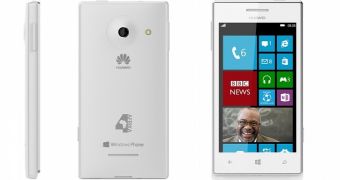Bad news for Windows Phone fans who were expecting more companies to launch devices powered by Microsoft’s mobile platform, as Huawei has announced that it has decided to put on hold plans to bring new Windows Phone handsets on the market.
The Chinese company was expected to launch at least one mid-range Windows Phone smartphone by the end of this year, but it looks like this won’t happen anymore.
WMPoweruser reports that Richard Yu, Huawei’s head of consumer business group, has told Wall Street Journal in an interview that his company tried using the Windows Phone operating system, but without any success.
Apparently, the Chinese handset maker has been losing money for two years now on their own Windows Phone handsets, as the company hasn’t been able to convince customers that Huawei smartphones are worthy competitors to Nokia Lumia phones.
Given the fact that Yu doesn’t see any solutions to the issue, he has decided that his company has “to put any releases of new Windows phones on hold. We have worries about Android being the only option, but we have no choice. And we have a good collaboration with Google.”
Moreover, Huawei’s plans are strongly tied with Google’s Android operating system, as the only viable platform with which the Chinese company can make a profit.
Yu has also been asked whether or not Huawei plans to launch smartphones powered by mobile platforms, other than Android and Windows Phone.
Obviously, the question refers to Tizen OS, which seems to be backed only by Samsung, as the only company that has plans for smartphones powered by this platform.
Well, it appears that Huawei did consider launching Tizen-powered smartphones, especially due to the fact that lots of carriers were pushing the Chinese company to make this move.
However, after long consideration, Yu has decided to disband the team in charge of researching the possibility of launching Huawei smartphones running Tizen OS. The reason is pretty simple, as according to Huawei’s official, “Tizen has no chance to be successful.”
At the end of his interview, Richard Yu says that his company does not have any plans on creating its own operating system that would power Huawei smartphones due to the fact that it’s very hard to create the ecosystem around it.
Even though Huawei has only launched a couple of affordable Windows Phone handsets in the last few years, it looks like the company doesn’t trust Microsoft’s OS anymore and is now looking to make a profit by focusing exclusively on Android phones.
It does look like Huawei has betrayed Microsoft over Windows Phone, but fairly speaking this is just business. What do our readers feel about Huawei’s move?

 14 DAY TRIAL //
14 DAY TRIAL //